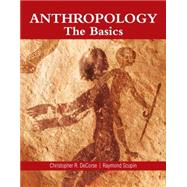NOTE: You are purchasing a standalone product; MyAnthroLab® does not come packaged with this content. If you would like to purchase both the physical text and MyAnthroLab, search for for 0134147278 / 9780134147277 Anthropology: The Basics plus MyAnthroLab for General Anthropology – Access Card Package
Package consists of:
• 0134012860 / 9780134012865 Anthropology: The Basics
• 0205990991 / 9780205990993 MyAnthroLab for General Anthropology Access Card
MyAnthroLab should only be purchased when required by an instructor.
For courses in General Anthropology
Explore the similarities and differences that characterize humanity
Anthropology: The Basics provides a concise introduction to the subfields of anthropology, designed for instructors who want an overview of key concepts, to which they can add supplementary case studies and readings. Incorporating both classic and current research, authors Christopher DeCorse and Raymond Scupin lead students to examine the similarities across cultures, as well as the differences among different peoples. Exploring interactions between anthropology and other fields, Anthropology: The Basics awakens students to anthropology’s unique, holistic perspective—sparking the critical imagination that brings learning to life.
Also available with MyAnthroLab
MyAnthroLab for General Anthropology courses extends learning online, engaging students and improving results. Media resources with assignments bring concepts to life, and offer students opportunities to practice applying what they’ve learned. And the Writing Space helps educators develop and assess concept mastery and critical thinking through writing, quickly and easily. Please note: this version of MyAnthroLab does not include an eText.
Anthropology: The Basics is also available via REVEL™, an immersive learning experience designed for the way today's students read, think, and learn.








